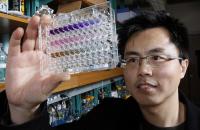W. Andy Tao, associate professor of biochemistry analytical chemistry and a member of the Purdue Center for Cancer Research team, has developed the pIMAGO nanopolymer to assess the efficacy of cancer drugs against biochemical processes that cause the formation of cancer cells.
The substance binds itself to specific proteins that will be traced later by a simple laboratory test called chemiluminescence.
 Purdue's Tao wth the pIMAGO
Purdue's Tao wth the pIMAGO
Tao established a company, Tymora Analytical in the Purdue Research Park, to develop the pIMAGO nanopolymers. The 'p' denotes phosphor, and the IMAGO is a derivative of the Greek word for image. The nanopolymers are covered with titanium ions to attract and attach themselves to the phosphorylated proteins. A phosphate group has been mixed with a protein to create an enzyme called kinase. Kinase creates cancer cells when it is overactive. A number of cancer drugs have been developed to combat this kinase activity.
The nanopolymers will be mixed in a solution of proteins to develop a chemical that accelerates phosphorylation, and a drug to stop kinase activity. Phosphorylated proteins will prevail in cases where the drug is ineffective. The protein Avidin attached with the enzyme horseradish peroxidase Avidin-HRP will be added. Avidin attaches itself to a vitamin B acid, biotin on the nanopolymer’s surface. Later, a chemical substrate is added to elicit a response with HRP, making the solution change color. A light shade of color indicates minimal kinase activity and low phosphorylated protein count will indicate that the drug is working. A dark shade will indicate excess kinase movement and that the drug is ineffective.
The kinase inhibitors tested with antibodies is an expensive procedure since antibodies are rare and unavailable for some cell types. Radioisotope tests are controlled and hazardous due to radiation. This would make the polymer technology both an accessible and cost- effective alternative.
Source: http://www.purdue.edu/